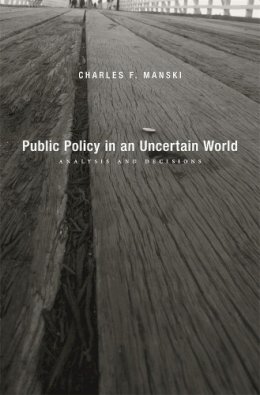7%OFF

Stock image for illustration purposes only - book cover, edition or condition may vary.
Public Policy in an Uncertain World: Analysis and Decisions
Charles F. Manski
€ 52.80
€ 49.02
FREE Delivery in Ireland
Description for Public Policy in an Uncertain World: Analysis and Decisions
Hardback. Manski argues that public policy is based on untrustworthy analysis. Failing to account for uncertainty in an uncertain world, policy analysis routinely misleads policy makers with expressions of certitude. Manski critiques the status quo and offers an innovation to improve both how policy research is conducted and how it is used by policy makers. Num Pages: 224 pages, 1 graph, 3 tables. BIC Classification: 1KBB; JHB; JPQB. Category: (G) General (US: Trade). Dimension: 163 x 242 x 21. Weight in Grams: 464.
Public policy advocates routinely assert that “research has shown” a particular policy to be desirable. But how reliable is the analysis in the research they invoke? And how does that analysis affect the way policy is made, on issues ranging from vaccination to minimum wage to FDA drug approval? Charles Manski argues here that current policy is based on untrustworthy analysis. By failing to account for uncertainty in an unpredictable world, policy analysis misleads policy makers with expressions of certitude. Public Policy in an Uncertain World critiques the status quo and offers an innovation to improve how policy research is ... Read more
Show LessProduct Details
Publisher
Harvard University Press
Number of pages
224
Format
Hardback
Publication date
2013
Condition
New
Number of Pages
224
Place of Publication
Cambridge, Mass, United States
ISBN
9780674066892
SKU
V9780674066892
Shipping Time
Usually ships in 7 to 11 working days
Ref
99-1
About Charles F. Manski
Charles F. Manski is Board of Trustees Professor of Economics at Northwestern University.
Reviews for Public Policy in an Uncertain World: Analysis and Decisions
To academic readers steeped in [economics and decision theory], [Manski's] account is likely to be of some interest. It includes many useful and important insights (for example, the distinctions among policies based on the principles of 'maximin,' 'minimax,' and 'adaptive mini-max' regret) that have substantial implications for real-world policy.
Brian Baird
Science
Brian Baird
Science
